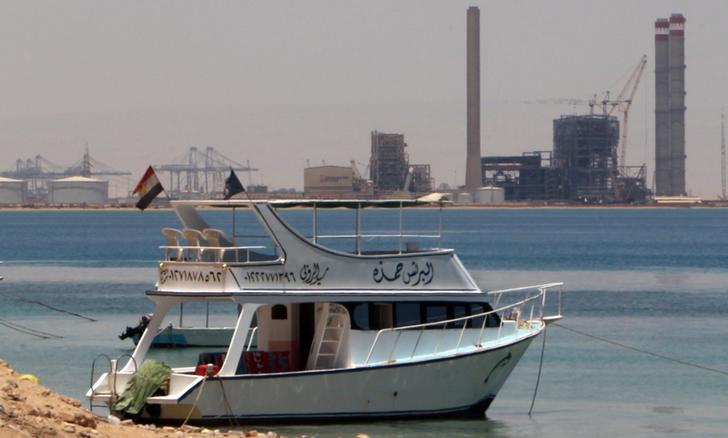Latest NEWS
- Aswat Masriya, the last word
- Roundup of Egypt's press headlines on March 15, 2017
- Roundup of Egypt's press headlines on March 14, 2017
- Former Egyptian President Hosni Mubarak to be released: lawyer
- Roundup of Egypt's press headlines on March 13, 2017
- Egypt's capital set to grow by half a million in 2017
- Egypt's wheat reserves to double with start of harvest -supply min
- Roundup of Egypt's press headlines on March 12, 2017
As many as 700 migrants feared drowned in Mediterranean

A boat is docked at a beach, near a cement factory at El Ain El Sokhna port in Suez, 140 km (87 miles) east of Cairo, July 6, 2012. REUTERS/Amr Abdallah Dalsh
By Stephanie Nebehay
GENEVA (Reuters) - More than 700 people fleeing Africa and the Middle East may have drowned in shipwrecks in the Mediterranean over the last week, bringing the death toll this year to almost 3,000, the International Organisation for Migration (IOM) said on Monday.
In the worst incident, as many as 500 migrants are believed to have died after traffickers rammed their ship off Malta's coast last week, an event that only came to light this weekend in testimony from two of nine survivors.
The survivors said the traffickers ordered the migrants to change vessels in the middle of the Mediterranean. The migrants refused, leading to a confrontation that ended when traffickers rammed the ship carrying the migrants, causing it to sink, IOM spokeswoman Christiane Berthiaume told Reuters in Geneva.
"Some 500 people were on board - Syrians, Palestinians, Egyptians and Sudanese. They were trying to reach Europe," Berthiaume said.
"That means that 700 people perished at sea these last days in the Mediterranean, the deadliest incidents in the space of a few days," she said.
The vessel had set off on Saturday, Sept 6 from Damiette, Egypt, and sank off Malta's coast on Sept 10th, she said, adding that some of the survivors were only rescued on Friday.
The U.N. refugee agency also learned of the shipwreck off Malta, but said its information was that it occurred on Friday. The UNHCR could not confirm the circumstances of the incident but understood that the death toll was closer to 300.
"We don't have confirmation of this account of alleged ramming. That was given to Malta authorities by survivors, but we can't confirm it," said UNHCR spokesman Francis Markus.
The UNHCR was trying to get confirmation of five shipwrecks in all. "At least 500 people have died or are missing in the last three days", he said.
'DEADLIEST WEEKEND EVER'
"It was without any doubt the deadliest weekend ever in the Mediterranean," Carlotta Sami of the UNHCR said.
In the incident off Malta, nine people survived and were picked up boats, Berthiaume said. IOM officials interviewed two Palestinian survivors in Sicily, Italy, while other survivors were taken to Malta and to Crete, Greece, she said.
Another ship packed with up to 250 African emigrants sank off the Libyan coast, and most of them are feared dead, a spokesman for the Libyan navy said late on Sunday. Some 26 people survived.
Migrants have been streaming out of North Africa, mostly lawless Libya, in rickety boats in rising numbers for years. Many head for Italy, a gateway to the European Union (EU).
"A combination of factors have led to a major increase. They do not have other very easy options to get anywhere else from Libya. They are not able to get to surrounding countries in North Africa from Libya. These are all factors pushing up the number of people desperate to make the crossing who are preyed on by unscrupulous traffickers," Markus said.
Some 130,000 people have arrived in Europe by sea so far this year, compared with 60,000 last year, according to the UNHCR. Italy has received more than 118,000, most of them rescued at sea under its naval operation Mare Nostrum.
U.N. High Commissioner for Refugees Antonio Guterres and UNHCR special envoy Angelina Jolie visited the naval rescue headquarters in Malta on Sunday, meeting survivors, the agency said in a statement issued on Monday.
"Amidst concerns about the sustainability of the Italian Mare Nostrum operation, they also called for increased efforts by European nations to contribute to rescue efforts and reduce deaths at sea," the UNHCR said.
Half of those arriving in Europe by boat are refugees from Syria and Eritrea, according to the agency.
"We all need to wake up to the scale of this crisis. There is a direct link between the conflicts in Syria and elsewhere and the rise in deaths at sea in the Mediterranean," Jolie said.
"Unless we address the root causes of these conflicts, the numbers of refugees dying or unable to find protection will continue to rise," she said.
(Reporting by Stephanie Nebehay; Editing by Ralph Boulton)










